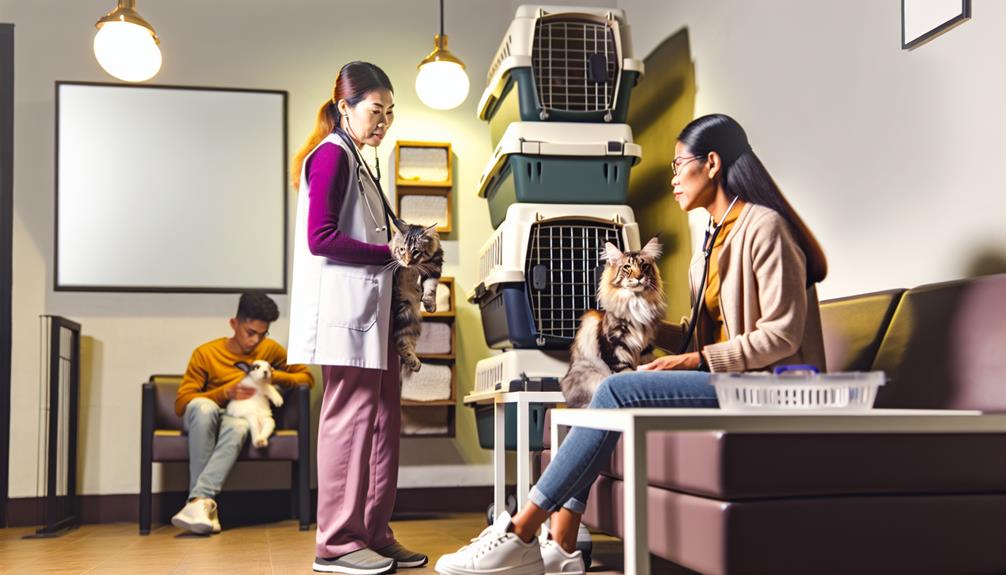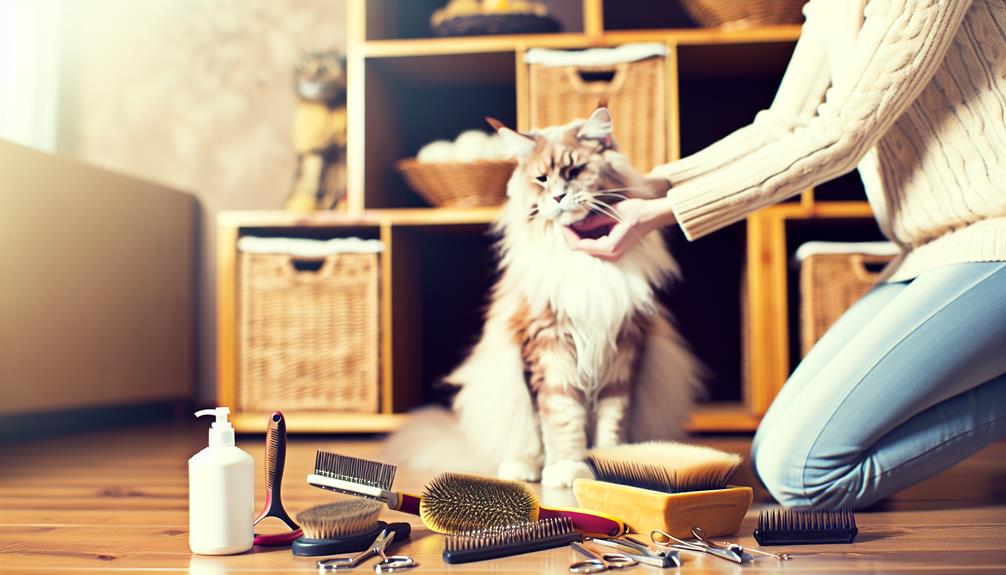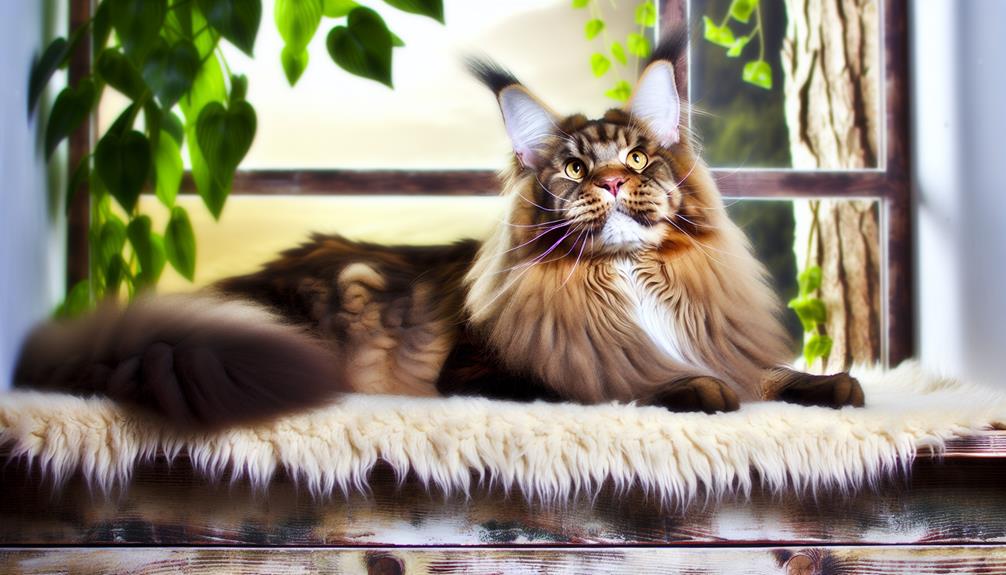You're considering a Maine Coon cat and wondering about the price tag. Prices can range greatly, typically from $800 to $2,000, influenced by factors like the breeder's reputation and health certifications. But that's just the beginning. Have you thought about the added costs of initial veterinary care, food, grooming, and annual medical expenses? These factors can considerably affect your budget, making it essential to understand all financial aspects before deciding. Curious about the differences between purchasing from a breeder and adopting from a shelter? Let's explore these considerations in detail.
Purchase Price
When considering the purchase price of a Maine Coon cat, it is essential to understand the factors that contribute to their cost. The Maine Coon is one of the largest domesticated cat breeds, and their distinctive characteristics, such as their long, tufted ears, bushy tails, and sociable personality, make them highly desirable. Their popularity as a breed considerably influences their market price.
First, you should be aware that Maine Coons are often priced higher due to their striking physical traits. The breed's large frame, silky fur, and expressive eyes are results of selective breeding, aimed at enhancing these specific Maine Coon characteristics. Additionally, their friendly and intelligent nature makes them excellent companions, further driving demand and, consequently, their price.
Another aspect affecting the purchase price is the breed's popularity. Maine Coons have consistently ranked among the top cat breeds due to their appealing looks and gentle temperament. This high demand means breeders often have waiting lists, which can also push prices up. When supply can't keep up with demand, the cost inevitably rises.
Furthermore, the pedigree of the cat plays a considerable role. Purebred Maine Coons with documented lineage, health checks, and vaccinations will often cost more. Reputable breeders invest considerable resources in genetic testing and health screenings to guarantee the well-being of their cats, and these costs are reflected in the final price.
Breeder Vs. Adoption
Considering whether to obtain a Maine Coon cat from a breeder or through adoption involves weighing the pros and cons of each option. Each route has distinct advantages and considerations, which can greatly impact your experience as a pet owner.
Choosing a breeder allows you to guarantee the cat's lineage and health history. A reputable breeder typically provides detailed information about the cat's pedigree, genetic health screenings, and early socialization. Breeder reputation is vital; established breeders adhere to ethical practices and guarantee their cats are raised in a healthy environment. However, purchasing from a breeder often comes with a higher price tag, reflecting the costs of maintaining breeding standards and health guarantees.
On the other hand, adoption benefits include lower initial costs and the opportunity to give a cat a second chance at a loving home. Many Maine Coons end up in shelters or rescue organizations due to unforeseen circumstances, not because of behavioral or health issues. Adopting from a shelter often comes with the added advantage of the cat being spayed/neutered and vaccinated. Additionally, adoption fees typically support the shelter's mission, aiding more animals in need.
While breeders can offer assurances about a cat's background, adoption provides the satisfaction of knowing you've rescued a pet. Each option requires careful consideration of your priorities, whether they be cost, ethical concerns, or specific traits of the Maine Coon.
Ultimately, whether you choose a breeder or adoption, thorough research and due diligence are important. Verify the breeder is reputable or the adoption agency is well-reviewed to secure a healthy and happy Maine Coon cat.
Initial Veterinary Costs

When you bring home a Maine Coon cat, you'll need to budget for initial veterinary costs, which include vaccination and immunization fees to protect against common feline diseases. Routine health check-ups are essential to monitor your cat's overall well-being. Additionally, spaying or neutering is an important procedure to take into account for long-term health benefits and population control.
Vaccination and Immunization Fees
Vaccination and immunization fees are an important part of the initial veterinary costs for your Maine Coon cat. Ensuring your cat adheres to proper immunization schedules can greatly impact their overall health and longevity. Typically, your Maine Coon will need a series of core vaccines, including those for feline viral rhinotracheitis, calicivirus, and panleukopenia (FVRCP), as well as rabies.
The vaccination benefits can't be overstated. Vaccines help your cat build immunity to serious, potentially life-threatening diseases. For example, the FVRCP vaccine protects against common viral infections that can cause respiratory issues and severe gastrointestinal problems. The rabies vaccine is not only vital for your pet's safety but is also often legally required.
Initial immunization schedules usually start when your kitten is around six to eight weeks old, with booster shots following every three to four weeks until they are about 16 weeks old. After the initial series, most vaccines require annual or triennial boosters. Costs can vary, but you should budget approximately $100 to $200 for the initial series of vaccines. These fees are a small price to pay for the considerable health benefits they provide your Maine Coon.
Routine Health Check-ups
Routine health check-ups are an important aspect of your Maine Coon cat's ongoing care, ensuring early detection and prevention of potential health issues. Regular visits to the vet will help maintain your cat's overall well-being through systematic health monitoring and preventive care. Initial veterinary costs for a new Maine Coon often include a thorough health examination, allowing the vet to establish a baseline for your cat's health.
Here are the primary components of a routine health check-up:
- Physical Examination: The vet will assess your cat's essential signs, weight, and overall physical condition to identify any abnormalities or areas of concern.
- Diagnostic Tests: Blood tests, urinalysis, and fecal examinations are conducted to detect possible infections, parasites, or underlying health conditions.
- Dental Check: Dental health is crucial for cats. The vet will examine your cat's teeth and gums for signs of dental disease, which can lead to more severe health issues if untreated.
- Parasite Control: External and internal parasite prevention is important. Your vet will recommend appropriate treatments to safeguard your cat against fleas, ticks, and worms.
Spaying or Neutering Costs
Spaying or neutering your Maine Coon cat is an essential step in responsible pet ownership, contributing to the health and behavioral benefits of your feline companion. Spaying benefits include a considerably reduced risk of uterine infections and breast tumors, which are malignant in about 90% of cats. Neutering, on the other hand, helps prevent testicular cancer and can mitigate certain aggressive behaviors and territorial marking, debunking many neutering myths suggesting it negatively impacts the cat's personality.
The cost of spaying or neutering can vary widely depending on your location and the specific veterinary clinic you choose. On average, you can expect to spend between $200 and $500 for the procedure, which often includes initial veterinary costs such as pre-operative blood work and post-operative care. Some clinics offer low-cost spaying and neutering programs, so it's worth exploring these options to manage expenses.
Investing in spaying or neutering not only improves your Maine Coon's quality of life but also helps control the pet population, reducing the number of unwanted animals in shelters. Understanding these costs and benefits guarantees you're making a well-informed decision for your feline friend.
Food and Nutrition
When it comes to the sustenance of Maine Coon cats, nutritional integrity is essential. These majestic felines have specific dietary preferences that require careful consideration. Due to their large size and active nature, Maine Coons need a diet rich in protein and low in carbohydrates. Integrating high-quality, meat-based proteins helps maintain their muscular frame and supports overall health.
To guarantee your Maine Coon thrives, adhere to feeding guidelines that consider their unique needs. Here are some key points to keep in mind:
- Protein Content: Opt for cat foods that list a high-quality protein source, such as chicken, fish, or beef, as the primary ingredient. Aim for a protein content of at least 40% on a dry matter basis.
- Fat Levels: Healthy fats are essential for energy and coat health. Look for foods with 20-25% fat content. Omega-3 and Omega-6 fatty acids are particularly beneficial.
- Avoid Fillers: Steer clear of cat foods that contain corn, wheat, or soy. These fillers can lead to weight gain and may cause digestive issues.
- Feeding Frequency: Unlike some breeds, Maine Coons benefit from multiple small meals throughout the day. Three to four feeding sessions help manage their energy levels and prevent overeating.
Monitoring your cat's weight and adjusting portions as needed is vital. Regular veterinary check-ups will help tailor their diet to any emerging health conditions. By focusing on these feeding guidelines and understanding their dietary preferences, you can guarantee your Maine Coon leads a healthy, active life. Proper nutrition is not just about feeding your cat; it's about investing in their long-term well-being.
Grooming Supplies

Grooming supplies for a Maine Coon cat are vital to maintaining their luxurious coat and overall hygiene. Due to their dense, long fur, Maine Coons require a rigorous grooming routine to prevent mats and tangles. The grooming frequency for these felines should be at least two to three times a week, although daily grooming is ideal for best fur maintenance.
First, invest in a high-quality slicker brush and a metal comb. The slicker brush will help remove loose fur and detangle minor knots, while the metal comb is perfect for deeper fur maintenance, getting down to the undercoat, and preventing mats. A de-shedding tool like the FURminator can also be beneficial, especially during shedding seasons.
Next, you'll need a pair of cat-safe grooming scissors for trimming any stubborn mats that brushing won't remove. Be cautious and gentle to avoid cutting the skin. Additionally, a grooming rake is useful for reducing shedding and maintaining a healthy coat.
Shampoos and conditioners formulated specifically for cats are non-negotiable. Maine Coons have sensitive skin, and human products can cause irritation. A hypoallergenic or oatmeal-based shampoo is often recommended. Bathing should be done once a month or as needed based on your cat's lifestyle and fur condition.
Don't forget nail clippers designed for cats to keep their claws in check. Regular nail trimming is important to prevent overgrowth and related issues.
Lastly, consider buying grooming wipes for quick clean-ups and a grooming table or mat to make the process easier and more comfortable for both you and your Maine Coon. Proper grooming supplies are not just an investment in your pet's appearance but also in their health and well-being.
Annual Medical Expenses
When budgeting for a Maine Coon, you'll need to account for routine vet checkups, vaccinations, and boosters, which are essential for maintaining their health. Emergency care costs can also arise unexpectedly and should be factored into your annual expenses. Understanding these medical requirements will help you manage your pet's overall healthcare budget effectively.
Routine Vet Checkups
Why are routine vet checkups essential for your Maine Coon cat's well-being? Regular vet visits guarantee that your Maine Coon's dietary needs are met and address any potential health issues early on. These checkups are a critical preventive measure to catch diseases before they become serious and costly. Annual exams usually include a physical examination, blood tests, and a review of your cat's overall health status.
Here are four key aspects covered during routine vet checkups:
- Weight and Nutrition Assessment: Vets evaluate your cat's weight and dietary needs, confirming they're on a balanced diet that supports their growth and health.
- Dental Health: Dental issues can lead to more severe health problems. Regular vet visits include teeth cleaning and checking for signs of gum disease or tooth decay.
- Parasite Prevention: Maine Coons are prone to parasites like fleas and ticks. Routine checkups help in administering preventive measures and treatments.
- Chronic Disease Monitoring: Conditions like diabetes or kidney disease can be managed more effectively when caught early. Regular checkups enable timely intervention and management.
Routine vet checkups are indispensable for maintaining your Maine Coon's peak health, greatly reducing the risk of severe health complications.
Vaccinations and Boosters
Maintaining your Maine Coon's health doesn't stop at routine vet checkups; vaccinations and boosters are another cornerstone of their annual medical care. Ensuring your cat is up-to-date with the appropriate vaccine types is vital for preventing serious illnesses. The primary vaccinations include Feline Viral Rhinotracheitis, Calicivirus, and Panleukopenia (FVRCP), Rabies, and Feline Leukemia Virus (FeLV). Each of these vaccines has its own booster schedules that you'll need to follow for full efficacy.
Here's a breakdown of the typical vaccine types and booster schedules:
| Vaccine Type | Initial Dose | Booster Schedule |
|---|---|---|
| FVRCP | 6-8 weeks | Every 3-4 weeks until 16 weeks old |
| Rabies | 12-16 weeks | Annually or triennially |
| FeLV | 8 weeks | 3-4 weeks after initial, then annually |
| Bordetella | 8 weeks | Annually |
| Feline Immunodeficiency Virus (FIV) | 8 weeks | Annually |
Maintaining these vaccinations and adhering to booster schedules will greatly reduce your Maine Coon's risk of contracting various diseases. It is important to consult your vet for a tailored vaccination plan, as some vaccines might not be necessary depending on your cat's lifestyle and environment.
Emergency Care Costs
Emergency care costs can, without a doubt, be an unexpected and significant part of your Maine Coon's annual medical expenses. Emergency procedures are often necessary due to sudden accidents or unexpected illnesses, and they can quickly add up. It's vital to be prepared for these potential expenses to guarantee your Maine Coon receives the best care possible.
Here are some common emergency care costs you might encounter:
- Emergency Vet Visits: These can range from $100 to $300 just for the consultation, depending on the severity of the situation.
- Diagnostic Tests: Blood tests, X-rays, and ultrasounds can cost between $200 and $500, essential for pinpointing the issue.
- Emergency Surgeries: Procedures like fracture repairs or intestinal blockages can set you back anywhere from $1,000 to $3,000.
- Hospitalization: Overnight stays and intensive care can cost between $500 and $1,500 per night, depending on the care level required.
These figures illustrate the potential financial impact of emergency care. While pet insurance can help mitigate some of these costs, it's wise to have an emergency fund specifically for your Maine Coon. By staying informed and prepared, you'll guarantee that your pet gets timely and effective treatment during emergencies.
Conclusion
To summarize, welcoming a Maine Coon into your home involves various costs, from the initial purchase price to ongoing expenses. For instance, if you buy a purebred Maine Coon for $1,500 and spend $500 on initial veterinary care, you're already investing $2,000. Add in yearly medical expenses, premium food, and grooming supplies, and the financial commitment becomes clear. It's important to understand these costs to guarantee you're fully prepared for the responsibility of owning this majestic breed.
